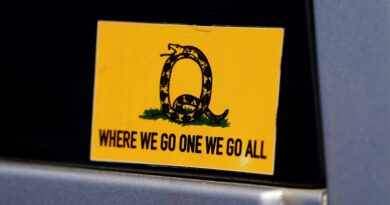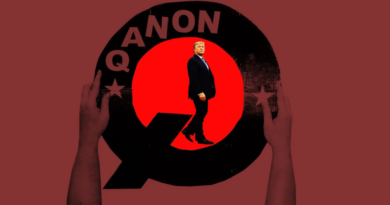What’s Become of QAnon Since Trump’s Defeat?
By Laurence Arnold and Daniel Zuidijk | Bloomberg,
Donald Trump’s presidency provided the bedrock for the fantastical U.S. conspiracy theory known as QAnon. That may help explain why QAnon adherents were well represented among the rioters who tried to stop the U.S. Congress from certifying Joe Biden’s victory. But even with Trump out of office, QAnon soldiers on.
1. What is QAnon?
It’s a collection of groundless allegations built around the notion that Democratic politicians, abetted by celebrities, are Satan-worshipping pedophiles who traffic children for sexual purposes. Trump, according to the tale, took office in 2017 to battle and take down this cabal. QAnon shares roots with the so-called PizzaGate conspiracy theory that took hold during the 2016 presidential campaign. It held that top Democrats including Hillary Clinton, Trump’s presidential opponent, were involved in a child sex-trafficking ring operating out of a Washington pizza restaurant. One follower drove from North Carolina to Washington to “self-investigate” the theory and fired an assault rifle into a closet at the restaurant. The Federal Bureau of Investigation has designated QAnon a domestic terrorism threat.
2. What outcome did QAnon predict?
Basically, that Trump would triumph. In October 2017, almost one year after Trump’s surprise win, someone using the name Q hinted on the pseudo-anonymous discussion board 4chan — a platform known for perpetuating white nationalism — that Clinton’s arrest was imminent. After that claim proved unfounded, Q continued to post cryptic content termed “drops,” which are deciphered into plain English. (The posts from Q moved to another discussion board, 8Chan, which is now called 8Kun.) QAnon believers awaited the “Great Awakening,” or the moment the general public realized the conspiracy exists, and the “Storm,” when thousands of wrongdoers were to face justice. That latter idea was fueled by a cryptic comment uttered by Trump during a 2017 photo op with military generals: “You guys know what this represents? Maybe it’s the calm before the storm.”
3. Who is Q?
Many believers long maintained that Q was a high-ranking government official in Trump’s inner circle with access to sensitive military information. (Within the U.S. Department of Energy, which is responsible for the nation’s nuclear-weapons program, the letter Q designates a high-level security clearance.) It’s possible that control of Q’s messages changed hands over the years. NBC News reported in 2018 that “a small-time YouTube video creator and two moderators of the 4chan website” banded together to turn initial Q posts into “an entire mythology.” More recently, the HBO documentary “Q: Into the Storm” suggested the person behind Q is Ron Watkins, the longtime administrator of 8kun. Watkins denies being Q.
4. How has QAnon explained Trump’s defeat?
Beyond a few vague comments — “Sometimes you must walk through the darkness before you see the light” — little has been attributed to Q since the Nov. 3 election. There have been no posts at all since Dec. 8. Some diehard followers are pouring over old drops for relevancy to current events. But QAnon may be moving on from Q, as evidenced by a QAnon conference in Dallas in late May. It featured influential figures within the QAnon community such as former National Security Advisor Michael Flynn and Sidney Powell, one of Trump’s former election lawyers, who stoked groundless claims that Trump will (or even could) somehow be reinstated as president.
5. What is Trump’s involvement?
As president, he retweeted QAnon content on multiple occasions. His repeated talk about a “deep state” of unelected government workers undermining his presidency, and about what he calls hoaxes and witch hunts, parallel the logic and language of QAnon. Asked about the conspiracy theory at a news conference in August 2020, Trump said, “I don’t know much about the movement other than I understand they like me very much, which I appreciate.”
6. How many people believe in QAnon?
A March poll by the Public Religion Research Institute and the Interfaith Youth Core found that 15% of Americans agreed with the core QAnon belief that “the government, media and financial worlds in the U.S. are controlled by a group of Satan-worshipping pedophiles who run a global child sex trafficking operation.” Among Republicans, that number was 23%.
7. Can anything be done?
Facebook, Twitter and YouTube began removing content and accounts related to QAnon last year. In response, QAnon influencers, groups and pages migrated to so-called alternative social networks, such as Parler. In October, the House of Representatives overwhelmingly passed a bipartisan resolution “condemning QAnon and rejecting the conspiracy theories it promotes.” In the November election, however, two Republicans who had endorsed or promoted QAnon content won election to the House.
More stories like this are available on bloomberg.com
©2021 Bloomberg L.P.


